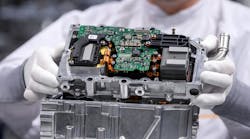NXP Sees No Path Out of Global Chip Shortage Before 2023
This article is part of TechXchange: Chip Shortages and Counterfeits
Executives at NXP Semiconductors said its supply situation is improving despite a chip shortage that has gripped the world for the last year. But the automobile chip giant sees the supply crunch lasting into 2023.
The company managed to snare more capacity at the contract manufacturers that make its chips and increased the capacity of its in-house fabs, CEO Kurt Sievers said on a conference call with analysts this week. He said NXP, the world's second-largest supplier of chips to the auto industry, would run its front-end fabs “full out” this year to help get through its order backlog and take further steps to expand capacity.
But demand for NXP's microcontrollers (MCUs) and other ICs is still outstripping its ability to supply them across its primary markets. "We anticipate 2022 will be another year of demand/supply imbalance with lead times extending out over almost the entire portfolio,” Sievers said."The level and intensity of supply-related conversations with our customers remain elevated."
Skyrocketing Sales
The automobile chip giant, which supplies a wide range of chips at the heart of new electric vehicles (EVs), said sales soared 21% to $3.01 billion for its first quarter compared to the same quarter last year. NXP reported profits of $1.7 billion in the quarter, up more than 30% from a year ago, driven largely by demand from auto OEMs and Tier-1 suppliers trying to rebuild inventory levels in the face of supply-chain constraints.
The strong gains in sales and profits underscore how the chip shortage is placing more power in the hands of NXP and other chip vendors like it that sell thousands of chips to tens of thousands of customers. These companies offer chips based on aging technology nodes that are building blocks in everything from factory equipment to smartphones. They are increasingly able to choose who gets how many of their scarce chips.
“Customers are coming to us," said CFO Bill Betz. "Unfortunately, we can't serve them all.”
Customers in its main automobile business are taking steps to untangle their sprawling supply chains and forging closer relationships with chip firms to secure supplies in the long term and get assistance in areas such as networking, self-driving systems, and battery management in EVs. Sievers has said he talks with car manufacturers and their suppliers almost every day to discuss their supply worries.
NXP said last year it partnered with Ford to roll out a completely new internal architecture for its global fleet of cars, including its flagship F-150 and all-electric Mustang Mach-E model. Ford will use NXP's S32G family of in-car networking processors that act as "gateways" to connect cars to the cloud, and i.MX8 processors that serve as "domain controllers," which distribute software updates to various subsystems in the vehicle.
More than half its quarterly revenue was from the automotive unit, at $1.55 billion, up 30% year-over-year.
Dealing with Supply Problems
NXP is at the center of a chip supply shortage that has roiled the electronics industry for more than a year, unresolved due to soaring demand for electronic goods such as personal computers. Snags in the supply chain have crippled a wide swath of industries and hiked prices on some consumer goods. The challenges have forced auto makers lacking chips to shut down plants, knocking out tens of billions of dollars in sales.
“We continue to see growing customer demand, outstripping supply, as inventory across all end markets is very lean,” noted Sievers. “Taken together, this underpins our continued confidence of robust growth in 2022."
NXP said sales in the current quarter would grow to $3.1 billion, riding a wave of demand from companies lacking crucial chips. That was ahead of the average analyst estimate of $2.95 billion, per Bloomberg.
The company said its gross margin in the fourth quarter came to 56.2%, and it would range from 55.8% to 56.9% in the first quarter, as auto makers focus on buying its most profitable chips to build premium cars.
NXP executives feel the company has more than enough production capacity to grow this year. NXP outsources the production of chips on nodes more advanced than 90-nm to its foundry partners.
NXP said that it has taken steps to assure parts supplies and its efforts should ease—but not completely resolve—the bottlenecks in its supply chain over the upcoming months. Executives said NXP has invested around $4 billion in pre-payments to lock in extra long-term production capacity at its foundries. It is also expanding its testing and packaging operations, according to Sievers, to ease constraints on its supply.
He said the supply problems have pushed it into more direct relationships with major car manufacturers, which are, in turn, sharing long-term forecasts, even for specific vehicle models, years ahead of time. The higher level of transparency helps it with capacity planning, giving it the confidence to place orders at its foundries and better project costs for raw materials that are on the rise due to the supply-chain crisis.
NXP said customers are also increasingly willing to sign non-cancellable, non-returnable contracts to secure supplies several years in advance, "which is a lot more stability than we've ever had in the past," Sievers said.
Sievers said the demand for its chips will outlast the current squeeze on supplies. Today, the average EV requires roughly 2,000 chips, according to industry analysts, which is at least 50% more semiconductor content than cars currently on the road.
Read more articles in TechXchange: Chip Shortages and Counterfeits

